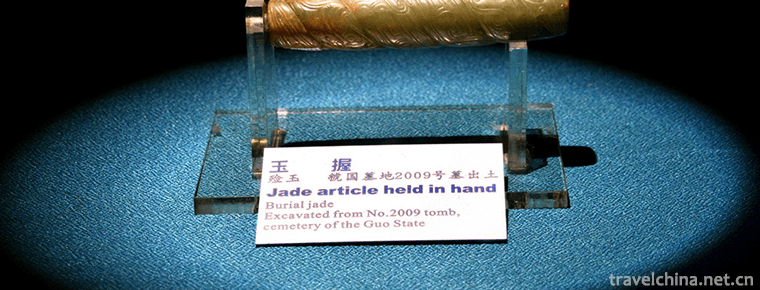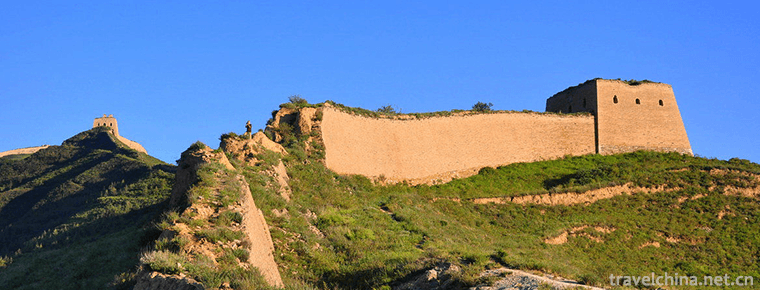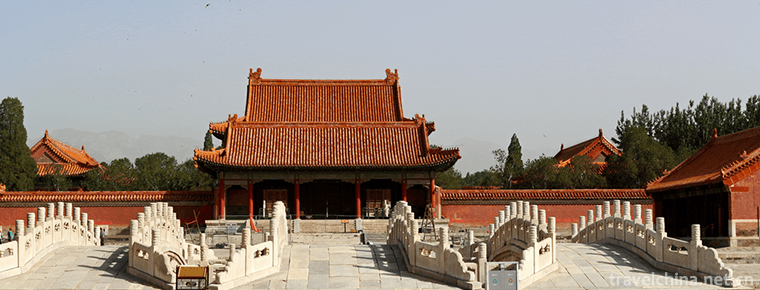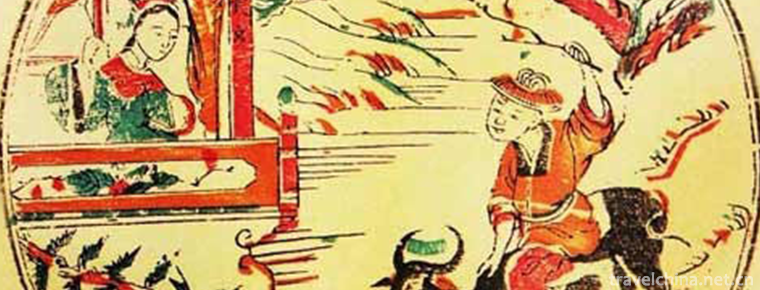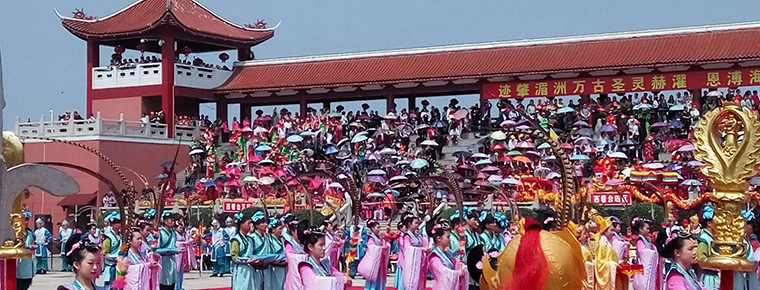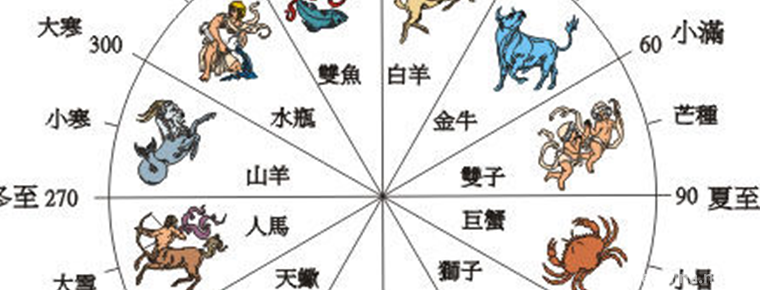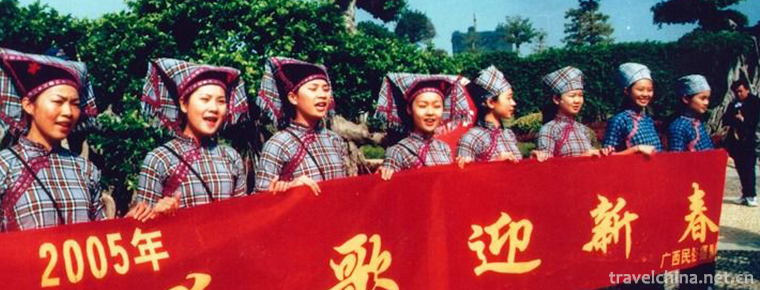Guangchang Meng Opera
Guangchang Meng Opera
Guangchang Mengxi Opera, a traditional local drama popular in Guangchang County, Jiangxi Province, is one of the national intangible cultural heritage.
Guangchang Mengxi Opera originated in the late Ming Dynasty. There are three ways in Guangchangyuan. The existing Chixi Zengjia Mengxi Opera and Liu Jiameng Opera on the back of the road have been annihilated naturally in the 1960s. Guangchang Meng Opera takes Meng Jiangnu's cry on the Great Wall as its theme. There are two folk troupes singing different scripts, different singing operas, and the plots are all the stories of Meng Jiangnu's cry on the Great Wall. The local people are commonly known as "Meng Opera". Guangchang Mencius Opera, as a kind of clan opera of rewarding gods and offering sacrifices to ancestors, has certain performing customs. Ganzhu Road Back Opera Troupe and Chixi Opera Troupe are in charge of the first morning of the first month and the first morning of the first month from December to the fifteenth day of the first month respectively.
In May 2006, Guangchang Mengxi Opera was listed in the first national intangible cultural heritage list, numbered IV-14.
historical origin
Legend
Long, long ago, the official emblem of Qin Shihuang recruited 800,000 migrant workers to build the Great Wall. The government arrests people everywhere to work as migrant workers. The captured people build the Great Wall day and night. They don't know how tired they are.
There is a scholar named Wan Xiliang in Suzhou. In order to escape the pursuit of the government, he had to hide everywhere. One day, he fled to Mengjia Garden and met Mengjiangnu unintentionally. Meng Jiangnu is a smart and beautiful girl. She hides Wan Xiliang with her parents. The two old men liked Wan Xiliang very much, so they married Meng Jiangnu to him as his wife.
Within three days of his marriage, Wan Xiliang was caught on business to repair the Great Wall. Meng Jiangnu cried like a tearful woman, waiting bitterly for her husband to return. Half a year later, Wan Xiliang had no news at all. It was late autumn, and the north wind was blowing, and the reeds were white. The weather became colder and colder day by day. Meng Jiangnu remembered that her husband was building the Great Wall in the north. It must be very cold. She sewed the cold clothes by herself and set out on her way to find Wan Xiliang on the Great Wall. Along the way, Meng Jiangnu did not know how many hardships she had experienced and how many hardships she had suffered before she came to the foot of the Great Wall. Who knows the migrant workers who built the Great Wall told her that Wan Xiliang was dead and the bones were filled in the wall. Hearing the heartbreaking news, Meng Jiangnu felt the sky was dark and fell to the ground at once. When she woke up, she cried sadly, and the sky was sad and the sun and the moon were dark. I don't know how long I cried, but suddenly I heard a tremendous noise like heaven and earth shaking. The Great Wall collapsed for tens of miles, revealing countless bones. Meng Jiangnu bit her finger and dripped blood on the bones of a body. She prayed in her heart that if it was her husband's bones, the blood would seep into the bones. If not, the blood would flow to all directions. Finally, Meng Jiangnu used this method to find Wan Xiliang's bones. She embraced the white bones and cried sadly.
Qin Shihuang saw that Meng Jiangnu was beautiful and wanted to force her to be a concubine. Meng Jiangnu promised him falsely, but asked Qin Shihuang to do three things first: ask the monk to read the 49-day Scripture to Wan Xiliang, and then bury him well; Qin Shihuang should personally lead the Minister of Wen and Wu to cry and sacrifice Wan Xiliang; after burying Wan Xiliang, Meng Jiangnu should go to visit mountains and rivers, and only after three days can she get married. Qin Shihuang had to agree to Meng Jiangnu's request. After three things were done, Meng Jiangnu scolded Qin Shihuang and jumped into the rolling sea.
Guangchang Meng Opera takes this legend as its theme.
Tracing to the source
Mencius opera has three ways in Guangchang. The existing Chixi Zengjia Mencius opera and Liu Jiameng opera on the back of the road have been annihilated naturally in the 1960s.
Chixi Zengjia Mengxi Opera is considered to be the Yuan script, which belongs to the two-night series. The whole play has 64 scenes. It takes 9 hours to finish and one one night to perform.
Liu Jiameng Opera in Dalubei is a legendary version of the Ming Dynasty. It began in the Ming Wanli Period. It is a three-night stand-alone version with 69 performances. It takes 11 hours to finish and is performed in three nights.
In 1981, the Guangchang Xuhe Theatre Troupe changed the name of "Meng Opera" on the back of the road to "The Great Wall". It sang high-pitched tunes and bullets, which made Meng Opera continue.
Representative repertoire
Guangchang Mengxi Opera originally had three ways. The existing Chixi Zengjia Mengxi Opera complete set of southern opera "Mengjiang Girl delivers cold clothes" and Liu Jiameng Opera legendary drama "The Great Wall" on the back of the road.
Inheritance and protection
Inheritance value
"Guangchang Meng Opera" has been widely recognized by the Chinese opera and music circles, and is known as "the living fossil of ancient Chinese opera vocal tune". Guangchang Meng Opera is included in the national key projects of art and scientific research, "Records of Chinese Opera" and "Music Integration of Chinese Opera".
Inheriting characters
Li Anping, male, Han nationality, born in April 1968 in Ganzhu Town, Guangchang County, Jiangxi Province. In February 2008, Li Anping was selected as the representative successor of the second batch of national intangible cultural heritage projects and declared in Guangchang County, Jiangxi Province.
Zeng Guolin, male, Han, born in 1955. In February 2008, Zeng Guolin was selected as the representative successor of the second batch of national intangible cultural heritage projects and declared in Guangchang County, Jiangxi Province.
Inheritance status
After the Cultural Revolution, the Jiangxi Provincial Culture Department and the Local Culture Bureau attached great importance to Guangchang Mengxi Opera and carried out a series of rescue and protection work. However, due to financial constraints, many planning and measures can not be implemented quickly, the opera has become increasingly old, and there are few successors. If we do not try to save it, it is likely that it will be annihilated in the long history like Shexi Mengxi opera.
protective measures
In November 1980, opera historian Liusha went to Ganzhu to make an in-depth investigation of Meng Opera. Shortly afterwards, he published his monograph "Survey of Haiyan Opera Remained in Guangchang Mengxi Opera".
In October 1981, a symposium of veteran artists was held in Guangchang County. After the meeting, veteran artist Xie Meisheng recorded three missing copies of Liu Jiameng Opera and recorded them all.
In October 1982, at the 366th anniversary of Tang Xianzu's death, held jointly by the Ministry of Culture, the Chinese Dramatists Association, the Jiangxi Provincial Cultural Bureau and the Jiangxi Branch of the Chinese Dramatists Association, the Meng Opera Folded Opera "Painting Bridge Separation", "Ginger Girls Delivery Clothes" and "Blood Dripping and Recognizing Man" organized by the Guangchang Qihe Drama Troupe made an exhibition performance, calling for another sensation in Gaoqiang. During this period, a symposium on high-pitched opera in Yuhe was held. Most of the participants were well-known domestic dramatists and opera musicians, as well as several foreign researchers.
In July 1984, the Yuhe Drama Troupe of Guangchang County rehearsed a complete set of three Liu Jiameng operas. In October, Jiangxi Opera Research Institute recorded all its videos. At the same time, the videos also include Meng Opera Folding Opera "Painting Bridge Separation", "Ginger Girl Delivering Clothes" and "Blood Dropping to Recognize a Man".
In December 1990, the recording of all the high-pitched tunes of Zeng Jiameng Opera was completed and performed by Zeng Deqi, a veteran artist of Zeng Jiameng Opera. So far, the excavation and rescue work of Guangchang Meng Opera has basically been completed.
social influence
Important performance
In July 2015, Guangchang launched a series of activities for the 2015 Folk Culture Week, in which Guangchang Meng Opera performed.
On the evening of October 20, 2016, "Four Dreams of Linchuan" was presented at Peking University, using the main voice of Meng Opera in Guangchang to perform in Xuhe Gaoqiang.
Important works
In October 1998, the Chinese Opera Chronicle Jiangxi Volume was published and published, among which the Call River Opera occupies a certain space. In December 1999, the Chinese Opera Music Collection Jiangxi Volume was published and published, among which Xuhe Opera occupied the second place. Because Guangchang Mencius Opera is a characteristic opera in Zhuohe Opera, which occupies a larger proportion. "Chinese Opera Music Integration --- Jiangxi Volume". The main part of Yuhe Opera is Yuhe Gaoqiang (Meng Opera Gaoqiang).

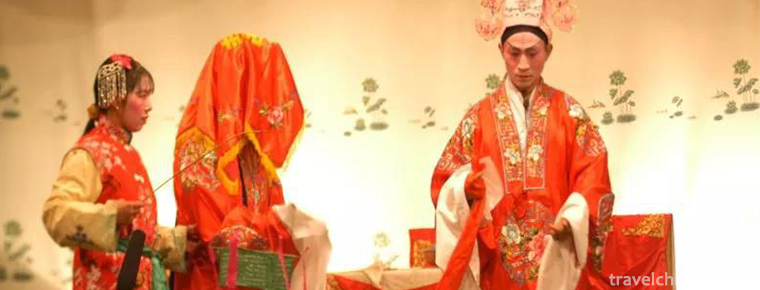
-
WeChat
WeChat is a free application that Tencent launched on January 21, 2011 to provide instant messaging services for intelligent terminals.
Views: 173 Time 2018-11-13 -
Kuanguo Museum
The Kuanguo Museum is a special museum built on the site of the Kuanguo Cemetery in the Western Zhou Dynasty, a national key cultural relic protection unit. It covers an area of 100,000 square meters.
Views: 206 Time 2019-01-13 -
Black Valley Scenic Area
Black Valley, National AAAAA Tourist Scenic Spot, National Forest Park, National Geopark, China's Best Leisure Mountain, China's Best Green Low Carbon Tourist Leisure Spot.
Views: 106 Time 2019-01-13 -
Qingshuihe Ming Great Wall Site
The site of the Great Wall of the Ming Dynasty begins at Jiayuguan in Jiayuguan City in the west, passing through Jiuquan, Gaotai, Linze, Zhangye, Shandan, Yongchang, Minqin.
Views: 176 Time 2019-02-07 -
Western Royal Tombs of the Qing Dynasty
Xiling Tomb of Qing Dynasty is located at the foot of Yongning Mountain, 15 kilometers west of Yixian Town, Baoding City, Hebei Province, more than 120 kilometers away from Beijing.
Views: 183 Time 2019-02-07 -
Xishuangbanna Primitive Forest Park
Xishuangbanna Primitive Forest Park, located in the east of Jinghong and north of Lancang River, is 8 kilometers away from the seat of the state capital..
Views: 170 Time 2019-02-25 -
Foshan Wood Engraving New Year Pictures
Foshan woodcut New Year's picture is a famous folk New Year's picture in South China and a wonderful flower of Lingnan traditional folk culture. It is as famous as the New Year.
Views: 175 Time 2019-04-29 -
The Mausoleum of the Yellow Emperor
The Mausoleum of the Yellow Emperor is one of the national intangible cultural heritages, which has formed a certain scale format and sacrificial ceremonies in the long-term practice..
Views: 150 Time 2019-05-04 -
24 solar terms of the lunar calendar
Twenty-four solar terms is a supplementary calendar that absorbs the "twenty-four solar terms" of the Ganzhi calendar to guide agriculture. It is the accumulation of long-term experience and.
Views: 169 Time 2019-06-08 -
Liao Song of the Zhuang Nationality
Liao Ge of Zhuang Nationality, folk literature of Pingguo County, Guangxi Zhuang Autonomous Region, is one of the national intangible cultural heritage..
Views: 140 Time 2019-08-16 -
Capital Institute of Physical Education
Capital Institute of Physical Education is a sports class in Beijing. Ordinary universities Located on Beijing City Haidian District, West Zhongguancun Science Park District, east of Yan Mu scenic are.
Views: 328 Time 2019-11-24 -
Wawushan National Forest Park
Wawushan National Forest Park is located in Hongya County, Meishan City, west of Sichuan Basin. It is 180 kilometers away from Chengdu and 100 kilometers away from Leshan. As of 1993, the park covers an area of 65869.80 hectares, rich in vegetation resources.
Views: 86 Time 2020-10-15

